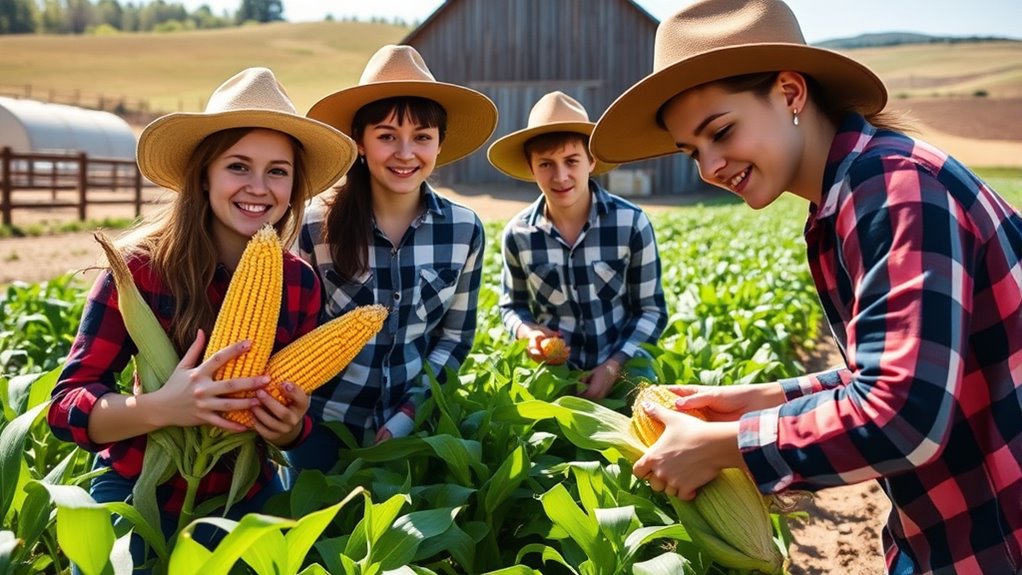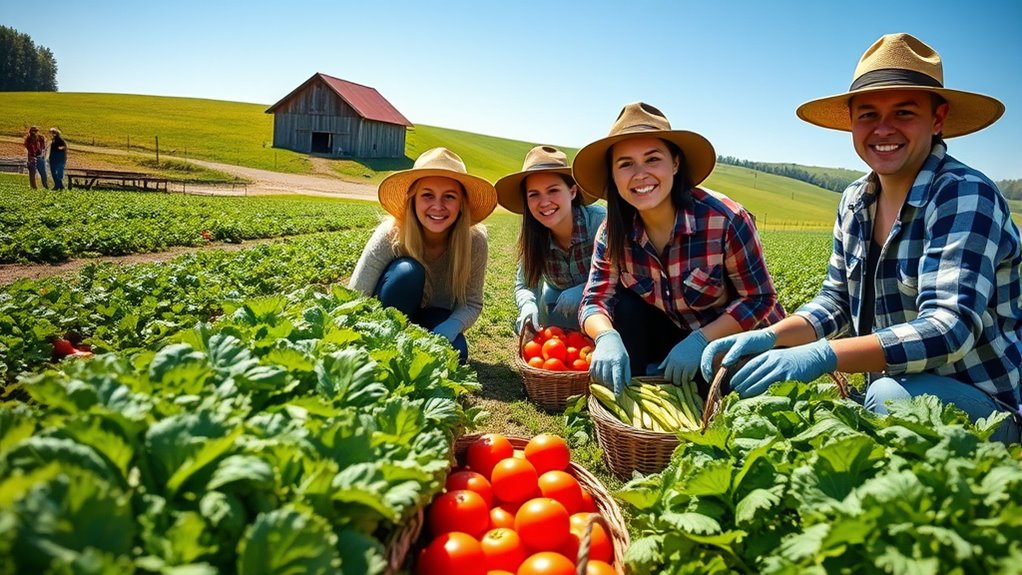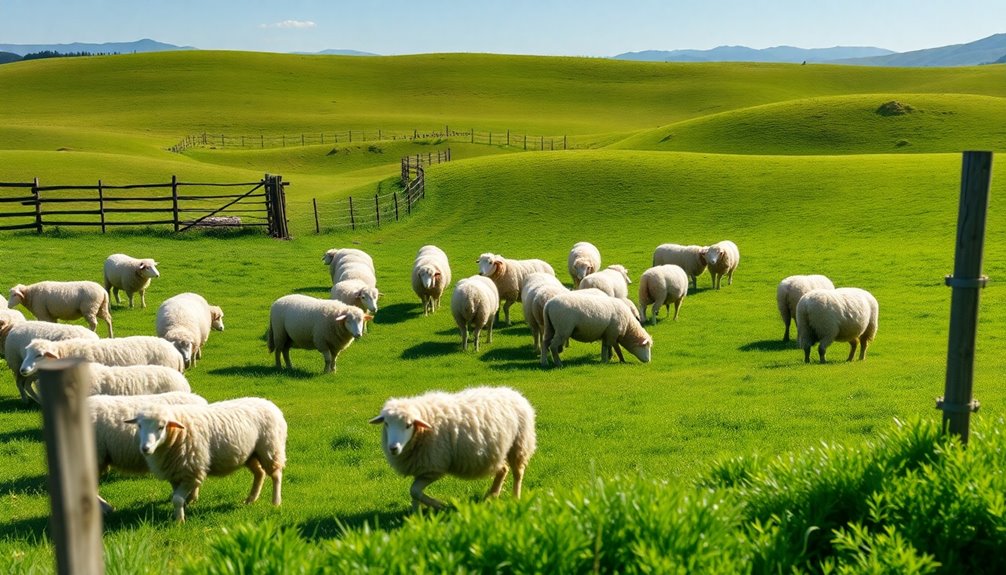To recruit help for harvest, develop a structured internship program that attracts motivated students enthusiastic to learn. Use targeted messaging on social media and local networks, emphasizing hands-on experience, sustainable practices, and modern technology. Screen applicants for enthusiasm and cultural fit, then clearly outline expectations. During harvest, provide real tasks and mentorship to keep interns engaged and productive. Continue exploring for tips on creating effective internships that benefit both your farm and emerging farmers.
Key Takeaways
- Develop targeted branding and outreach strategies to attract motivated interns during harvest season.
- Engage experienced staff as mentors to provide hands-on guidance and ensure productivity during busy times.
- Use social media, college partnerships, and open farm events to recruit enthusiastic and culturally fit candidates.
- Incorporate interns in harvest tasks with real-time problem-solving to enhance engagement and operational efficiency.
- Provide training on equipment use and sustainable practices to maximize intern contributions and promote long-term farm resilience.
Understanding Farm Internship Programs and Their Roles

Farm internship programs serve as essential bridges between aspiring farmers and the practical skills they need to succeed. These programs are designed to give you hands-on experience, helping you understand daily farm operations and develop your skills. One key aspect is the compensation structure, which varies widely—some internships offer stipends, housing, or academic credit, while others are unpaid but compensate with valuable learning opportunities. Mentorship opportunities are another crucial component; experienced farmers guide you through tasks, answer questions, and share industry insights. This hands-on support accelerates your growth and builds confidence. Effective leadership skills are also cultivated during internships as you learn to collaborate with teams and make strategic decisions. By participating, you gain more than just skills—you also build networks and gain industry knowledge, setting you up for future success in farming. Additionally, understanding the industry dynamics can help interns anticipate market trends and adapt to changing agricultural practices. Gaining exposure to remote work flexibility and innovative farm management methods can further enhance your adaptability in the evolving agricultural landscape. Moreover, awareness of banking and financial services can be beneficial for managing farm finances and accessing credit options. Incorporating principles from the Law of Attraction, such as maintaining a positive mindset and visualizing success, can also boost your motivation and resilience during your internship journey.
Benefits of Internships for Farms and Students

Internships offer significant benefits for both farms and students by fostering growth, innovation, and sustainability. As a student, you gain hands-on experience with essential practices like crop rotation, which helps improve soil health and reduces pest buildup. This real-world training deepens your understanding of sustainable farming methods and prepares you for future careers. For farms, interns bring fresh perspectives and help implement innovative techniques that enhance productivity and soil management. Internships also build stronger connections between educational institutions and local agriculture, ensuring a skilled workforce. By participating, you contribute directly to the farm’s long-term sustainability, while gaining practical skills that will serve you well throughout your agricultural career. Both sides benefit from this mutually rewarding relationship. Incorporating mentally stimulating activities such as problem-solving during internships can further enhance interns’ learning experiences. Engaging interns in environmentally sustainable practices can promote long-term farm health and resilience.
Key Elements of a Successful Internship Program

Creating a successful internship program requires careful planning and clear structure. One key element is providing extensive mentor training, making sure your mentors know how to guide and support interns effectively. Well-trained mentors foster a positive learning environment and help interns develop practical skills. Incorporating credit card insights can help you understand the importance of clear communication and transparency, which are essential in setting expectations. Electric power generation with bike generators can serve as a useful analogy for understanding how different energy sources contribute to overall efficiency. Regular internship evaluation is equally important; it allows you to gather feedback from interns and assess their progress. This ongoing review helps identify areas for improvement in your program and ensures interns meet your farm’s needs. Incorporating assessment methods into your evaluation process can help align intern activities with your farm’s overall mission. Additionally, understanding Gold IRA Rollovers can provide insight into diversification strategies that might benefit your farm’s financial planning. Clear expectations, structured activities, and consistent communication also contribute to success. When you combine effective mentor training with thorough internship evaluation, you create a program that benefits both your farm and your interns, leading to a more productive, engaging experience.
Strategies for Recruiting and Selecting Interns

To attract the right candidates for your internship program, you need targeted recruiting strategies that reach passionate and motivated individuals. Focus on strong internship branding to highlight your farm’s unique opportunities and values, making your program stand out. Building mentor relationships is essential; involve experienced farm staff to serve as mentors, demonstrating your commitment to intern growth. Use clear, compelling messaging across your outreach channels—social media, college partnerships, and local networks—to communicate the benefits of your program. When selecting interns, look beyond resumes; assess their enthusiasm, willingness to learn, and compatibility with your farm’s culture. A well-crafted recruitment process guarantees you attract dedicated interns who will contribute positively and grow professionally during their time with you. Additionally, incorporating creative exercises can help stimulate interns’ imagination and foster innovative thinking on your farm. Incorporating effective recruitment techniques such as hosting open farm days or informational webinars can further enhance your outreach efforts, especially when emphasizing aquatic exercise benefits or other farm-related wellness activities to attract health-conscious candidates. Moreover, highlighting the importance of understanding city and rural dynamics can appeal to interns interested in sustainable and community-focused agriculture practices, which aligns with current trends in agricultural sustainability.
Making the Most of Internships During Harvest Season

During harvest season, the energy and momentum on your farm reach a peak, providing an ideal opportunity to maximize intern involvement. Engage your interns with hands-on tasks that highlight Agricultural Technology, like operating advanced harvest equipment or monitoring crop yields with digital tools, which can also include utilizing specialized tools for crop assessment. This boosts their learning and productivity. Encourage the adoption of Sustainable Practices by involving interns in composting, water conservation, and integrated pest management. Assign them to real-time problem-solving, fostering a sense of ownership and contribution. Provide clear guidance and regular feedback to keep motivation high. Utilize their fresh perspectives to identify efficiency improvements. By actively integrating interns into your harvest activities, you not only get help during busy times but also cultivate future farm advocates committed to sustainable and tech-savvy agriculture. Additionally, involving interns in training and socialization activities can enhance their adaptability and teamwork skills, contributing positively to your farm environment. Incorporating modern farm equipment training can further prepare interns to handle future technological advancements effectively. Emphasizing sound science in your training programs can help interns understand the importance of evidence-based farming practices. Incorporating comprehensive educational content about crop management and sustainable methods can deepen their understanding and commitment.
Frequently Asked Questions
How Do Internships Impact Long-Term Farm Labor Planning?
Internships can profoundly impact your long-term farm labor planning by fostering a skilled, committed workforce. As interns gain experience, they contribute to essential tasks like crop rotation and pest management, ensuring sustainable practices. You can better anticipate labor needs, reduce turnover, and build a reliable team. Plus, involving interns in these practices helps them understand farm operations, leading to more efficient planning and improved crop yields over time.
What Legal Considerations Should Farms Be Aware Of?
Did you know that over 50% of farms face legal issues related to labor rights? When managing internships, you must prioritize legal compliance to avoid penalties. Guarantee your program adheres to labor laws, including fair wages, working hours, and safety standards. Respect labor rights by providing clear agreements and proper supervision. Staying informed helps you create a lawful, ethical environment that benefits both your farm and your interns.
How Do Cultural Differences Affect Intern Integration?
Cultural differences markedly impact intern integration, as you might face challenges like communication barriers and varying expectations. To foster cultural adaptation, you should encourage open dialogue, respect diverse backgrounds, and provide clear instructions. By understanding these differences, you can create an inclusive environment where interns feel valued and comfortable. This proactive approach helps smooth the integration process, ensuring everyone works harmoniously toward common goals.
What Safety Training Is Essential for Harvest Interns?
Think of safety training as the backbone of a smooth harvest. You must guarantee your interns understand essential safety protocols and emergency procedures to keep everyone safe. Cover proper equipment use, hazard recognition, and emergency response steps. Regular drills and clear communication help interns stay prepared. By prioritizing safety, you create a work environment where everyone feels secure and confident, making the harvest both productive and safe.
How Can Farms Measure Internship Program Success?
To measure your internship program’s success, you should track key internship metrics like participant engagement, skill development, and retention rates. Conduct regular program evaluations by gathering feedback from interns and supervisors to identify strengths and areas for improvement. Use these insights to refine your approach, ensuring your program effectively meets its goals and provides valuable experience. Monitoring these metrics helps you demonstrate the program’s impact and enhances future recruitment efforts.
Conclusion
By understanding farm internship programs, embracing their benefits, implementing key elements, employing effective recruitment strategies, and maximizing harvest season opportunities, you can create a thriving, mutually beneficial experience. You’ll attract talented interns, improve your harvest efficiency, and foster a stronger farm community. With clear goals, dedicated effort, and open communication, you’ll turn internships into powerful tools for growth and success—making your farm a hub of learning, productivity, and sustainability.










